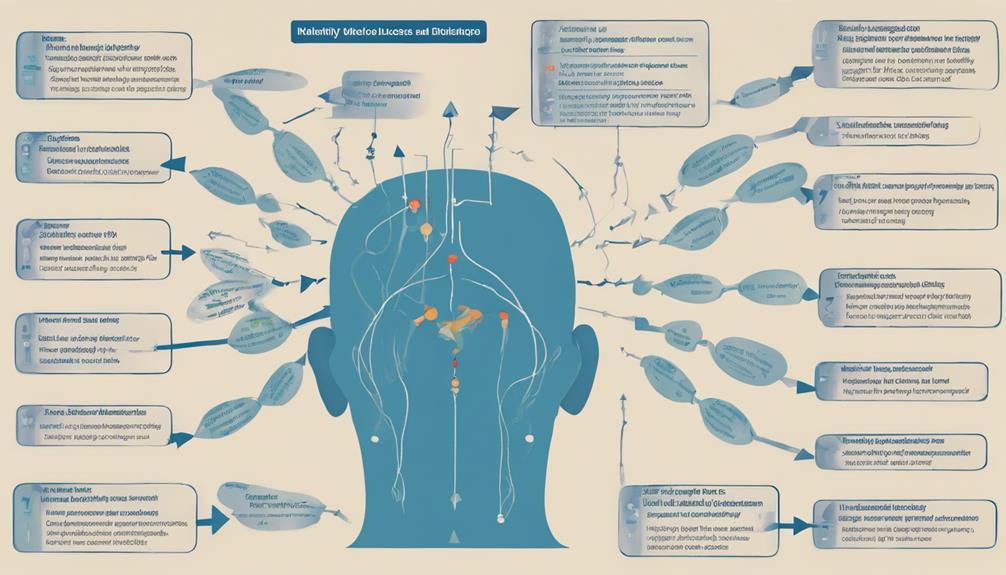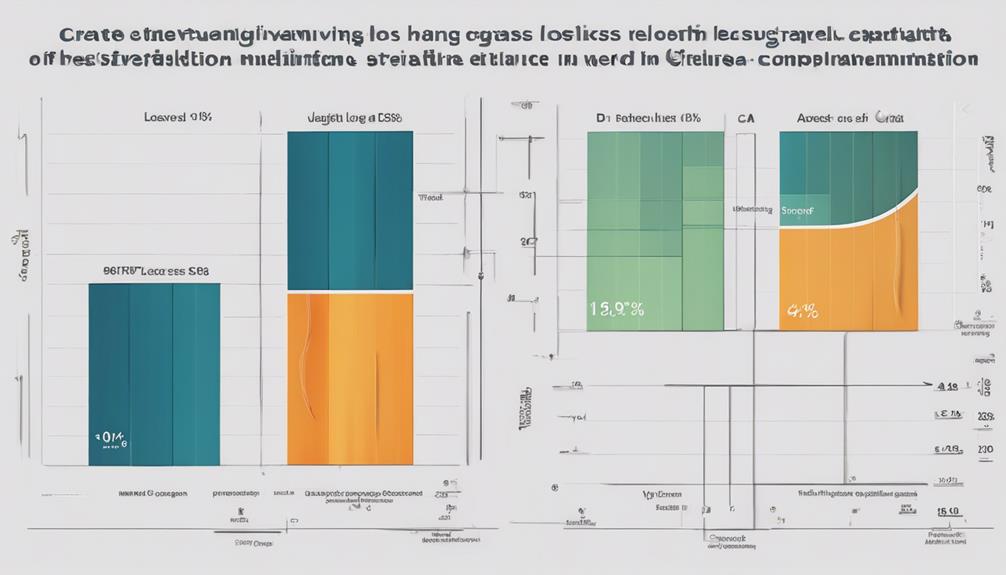When attempting to comprehend the intricacies of VA benefits, navigating the array of secondary conditions linked to hearing loss can feel like trying to navigate through a dense forest, where each path leads to a distinct outcome.
As we explore the realm of VA Secondary Conditions to Hearing Loss, we unravel a tapestry of interconnected factors influencing veterans' well-being and entitlements.
Join us as we unravel the complexities and shed light on the critical aspects that could significantly impact a veteran's journey towards receiving the benefits they rightfully deserve.
Key Takeaways
- Secondary conditions like migraines and anxiety can impact veterans with hearing loss.
- VA disability ratings consider the severity and connection of secondary conditions.
- Understanding and proving the link between secondary conditions and hearing loss is crucial for VA claims.
- Comprehensive evidence and expert support are essential for maximizing benefits related to secondary conditions.
Common Secondary Conditions to Hearing Loss
Migraines commonly accompany hearing loss, potentially associated with tinnitus, as one of the primary secondary conditions veterans may face. The interplay between these conditions can significantly impact mental health, leading to heightened levels of anxiety and depression among veterans.
Additionally, the development of Somatic Symptom Disorder (SSD) isn't uncommon in individuals experiencing hearing loss, altering their perception of physical symptoms and further complicating their well-being. Meniere's syndrome, characterized by issues with hearing and balance, can also manifest as a secondary condition linked to hearing loss in veterans.
These secondary conditions underscore the intricate nature of the challenges faced by veterans dealing with hearing impairment, emphasizing the need for comprehensive care that addresses not only the primary issue but also its potential ramifications on mental and physical health.
VA Disability Ratings for Secondary Conditions

When determining VA disability ratings for secondary conditions linked to hearing loss, the severity of symptoms and their impact on daily life play a crucial role in the evaluation process. Secondary conditions like tinnitus, migraines, anxiety, depression, somatic symptom disorder, and Meniere's syndrome can receive VA disability ratings based on these criteria.
Here are three key points to consider regarding VA disability ratings for secondary conditions:
- Severity Assessment: VA rates secondary conditions such as migraines, anxiety, depression, somatic symptom disorder, and Meniere's syndrome by assessing the severity of symptoms and how they affect the individual's daily functioning.
- Service Connection Requirement: Establishing service connection for secondary conditions to hearing loss necessitates a medical diagnosis, evidence of causation, and a medical nexus letter from a qualified provider to demonstrate the link between the hearing loss and the secondary condition.
- Top 5 Conditions****: Migraines, anxiety, depression, somatic symptom disorder, and Meniere's syndrome are among the top conditions linked to tinnitus for VA disability ratings, highlighting their significance in the evaluation process.
Impact of Secondary Conditions on VA Claims
How do secondary conditions impact the evaluation of VA claims related to tinnitus?
Secondary conditions such as anxiety, depression, migraines, and Meniere's syndrome play a crucial role in determining the disability ratings and benefits veterans receive for their tinnitus claims. Studies have shown a high prevalence of anxiety and depression among veterans with tinnitus, significantly affecting their overall well-being and quality of life.
Establishing a clear link between these secondary conditions and tinnitus is essential for veterans to receive the appropriate compensation and support from the VA. Conditions like migraines and Meniere's syndrome can lead to varying levels of disability ratings depending on the severity of symptoms experienced by the individual.
Therefore, veterans seeking VA benefits should carefully consider the impact of secondary conditions on their tinnitus claims to ensure they receive comprehensive assistance tailored to their specific needs. Understanding how secondary conditions influence VA claims is crucial for veterans to navigate the claims process effectively and secure the support they deserve.
Strategies for Establishing Secondary Service Connection

To establish secondary service connection for conditions related to hearing loss, what key strategies should be employed to strengthen the VA claims process efficiently? Here are three essential strategies to consider:
- Provide Comprehensive Medical Evidence: Gathering thorough medical evidence that clearly links the secondary condition to hearing loss is crucial. Detailed documentation can significantly strengthen the claim for secondary service connection.
- Obtain a Medical Nexus Letter: Securing a medical nexus letter from a qualified healthcare provider that explains the relationship between the secondary condition and hearing loss can greatly support the case. This letter serves as expert testimony regarding the medical connection.
- Highlight Impact on Overall Health: Demonstrating how the secondary condition impacts the individual's overall health and well-being due to hearing loss is vital. Showing the significant effects of the secondary condition strengthens the argument for secondary service connection.
Maximizing Benefits for Secondary Conditions
Maximizing VA disability benefits for secondary conditions hinges on providing comprehensive documentation and establishing a clear medical nexus between the conditions and service-connected impairments. Thorough evidence connecting secondary conditions such as migraines or anxiety to tinnitus is crucial in maximizing benefits.
Understanding the VA rating scale for conditions like depression or Meniere's syndrome secondary to tinnitus is essential for veterans seeking to optimize their benefits. Working with a qualified VA representative or attorney can greatly aid in successfully applying for benefits related to secondary conditions.
In cases where a lower rating or worsening of secondary conditions occurs, filing an appeal is a strategic step toward maximizing VA disability benefits. It's imperative to establish a solid link between tinnitus and secondary conditions to prove service connection and enhance benefits.
Frequently Asked Questions
What Is the VA Secondary Condition to Hearing Loss?
We understand that VA secondary conditions to hearing loss are medical issues linked to an individual's existing hearing impairment. Common secondary conditions include tinnitus, migraines, anxiety, depression, somatic symptom disorder, and Meniere's syndrome.
It's crucial to provide medical evidence establishing a direct connection between these conditions. Veterans can seek additional disability benefits by claiming secondary conditions to hearing loss.
Proper documentation and medical nexus letters are essential for successful VA claims regarding secondary conditions.
What Does the VA Consider Secondary Conditions?
When considering secondary conditions, the VA looks at disabilities or health issues that stem from or worsen a primary service-connected condition. These secondary conditions must directly relate to the primary condition to qualify for VA benefits.
Examples include tinnitus, migraines, anxiety, depression, somatic symptom disorder, and Meniere's syndrome.
Connecting the primary service-connected condition to the secondary one is key for securing VA disability benefits, often requiring medical evidence like a diagnosis and a nexus letter.
What Mental Conditions Are Secondary to Tinnitus?
We've found that Anxiety and Depression are common mental conditions linked to Tinnitus in Veterans. Research indicates a high prevalence of Anxiety and Depression among those with Tinnitus.
VA disability claims for Anxiety and Depression secondary to Tinnitus can be rated at varying levels based on severity, ranging from 0% to 100% impact on daily life.
The correlation between Tinnitus and mental disorders like Anxiety is well-documented, highlighting the importance of addressing these secondary conditions.
Is It Hard to Get VA Disability for Hearing Loss?
Getting VA disability for hearing loss can be tough. You need solid proof tying it to your military service. Medical records, noise exposure during service, and expert opinions are key.
The severity of your hearing loss and how it affects your daily life matter for VA ratings. A Compensation and Pension exam may be needed. Knowing the VA criteria and getting help from experts can make the process smoother.
Conclusion
In the intricate web of VA benefits, navigating secondary conditions to hearing loss can feel like untangling a complex puzzle. But with the right knowledge and strategies, veterans can unlock a treasure trove of support and resources.
Like skilled navigators charting a course through turbulent waters, veterans can steer towards a brighter future by understanding the nuances of secondary conditions and maximizing their benefits.
The journey may be challenging, but the rewards are well worth the effort.










